Social innovation refers to developing and implementing novel solutions to address social, cultural, or environmental challenges. These solutions often involve the creation of new products, services, or processes designed to improve the well-being of individuals, communities, or society as a whole. Social investment is the provision of financial resources to organizations, initiatives, or projects that aim to generate both a financial return and positive social or environmental outcomes. The social investment seeks to allocate capital in a way that creates shared value, balancing profit objectives with a commitment to driving meaningful change. Social innovation and investment are closely linked, as an investment is often required to support developing and scaling innovative solutions to social challenges. By leveraging financial resources, social investment can enable the growth and success of socially innovative projects, fostering sustainable development and positive social impact. Social innovation and investment play a critical role in addressing pressing social and environmental challenges, such as poverty, climate change, and inequality. Social innovation and investment can drive systemic change and promote a more equitable, sustainable future by supporting innovative approaches and directing financial resources towards solutions with the potential for meaningful impact. Through social innovation and investment, organizations can develop sustainable business models that balance financial objectives with a commitment to social responsibility. This approach fosters long-term success by aligning business practices with societal needs and expectations, ensuring that businesses remain relevant and competitive while also contributing to positive social outcomes. Social innovation and investment can stimulate economic growth and promote social inclusion by creating new markets, generating employment opportunities, and encouraging entrepreneurship. By supporting the development of socially responsible businesses and initiatives, social innovation and investment can help to build more inclusive economies that provide opportunities for all members of society. Product and service innovations involve the creation of new offerings designed to address specific social, cultural, or environmental challenges. These innovations often seek to improve the quality of life for individuals or communities by providing access to essential goods and services or by enhancing existing offerings to better meet the needs of target populations. Process innovations focus on improving the way that products or services are delivered or the manner in which organizations operate. These innovations can enhance efficiency, reduce costs, or improve the overall effectiveness of social initiatives, enabling organizations to have a greater impact on the issues they seek to address. Organizational innovations involve the development of new structures, systems, or practices within organizations that facilitate more effective problem-solving or decision-making. By fostering collaboration, enhancing communication, or promoting flexibility, organizational innovations can enable organizations to better address social challenges and deliver impactful solutions. System innovations aim to transform the broader social, political, or economic systems that contribute to social and environmental challenges. By addressing the root causes of these issues, system innovations can drive systemic change and create the conditions for lasting improvements in societal well-being. Impact investing refers to the practice of investing in organizations, projects, or initiatives that generate both financial returns and positive social or environmental outcomes. Impact investors seek to allocate capital in a manner that aligns with their values and supports the achievement of meaningful impact, often using specific metrics to evaluate and track the success of their investments. Social impact bonds are innovative financing instruments that involve private investors providing upfront capital to support social programs or interventions. Financial returns are contingent on the achievement of predefined social outcomes, with governments or other organizations repaying investors if the program meets its targets. This model incentivizes the delivery of effective social services. Venture philanthropy is a form of impact investing that combines the financial support of traditional philanthropy with the strategic approach and performance-oriented mindset of venture capital. Venture philanthropists typically provide financial, technical, and strategic assistance to social enterprises and nonprofits, aiming to scale their impact and achieve long-term sustainability. Corporate Social Responsibility (CSR) investments involve companies allocating resources, such as capital or expertise, to support social or environmental initiatives that align with their core values and business objectives. CSR investments can contribute to positive social outcomes while also enhancing a company's reputation and stakeholder relationships. Social entrepreneurs are individuals or teams who develop and implement innovative solutions to social, cultural, or environmental challenges. Through their creativity and determination, social entrepreneurs create social enterprises that prioritize social impact alongside financial sustainability, helping to drive change within their respective sectors. Nonprofit organizations play a significant role in social innovation and investment, often leading the development and implementation of innovative solutions to press social issues. Nonprofits can receive support from a range of sources, including government agencies, foundations, and impact investors, enabling them to scale their impact and achieve their mission. Government agencies are key players in the social innovation and investment landscape, providing financial resources, regulatory support, and policy guidance to facilitate the growth and success of socially innovative initiatives. By creating an enabling environment for social innovation and investment, governments can help to foster positive social change and sustainable development. Foundations and philanthropists contribute to social innovation and investment by providing financial support, strategic guidance, and access to networks and resources. Their long-term perspective and commitment to addressing social challenges can enable the development and scaling of innovative solutions with the potential for lasting impact. Impact investors and venture capitalists allocate capital to organizations, projects, or initiatives that generate both financial returns and positive social or environmental outcomes. By investing in socially innovative ventures, these investors can help to drive growth, scale impact, and create shared value across sectors. To assess the success of social innovation and investment initiatives, it is essential to establish clear and meaningful impact metrics. These metrics should be tailored to the specific context and objectives of the project, enabling stakeholders to track progress, evaluate effectiveness, and make informed decisions. Monitoring and evaluation (M&E) is a critical component of social innovation and investment, providing ongoing insights into the performance and impact of initiatives. M&E processes involve the systematic collection, analysis, and interpretation of data, helping stakeholders to identify strengths, weaknesses, and areas for improvement. Effective reporting and communication are essential for maintaining transparency and accountability in social innovation and investment. Organizations can build trust, foster learning, and demonstrate their commitment to driving positive social change by sharing progress, challenges, and outcomes with stakeholders. One of the key challenges in social innovation and investment is scaling successful initiatives to reach a broader audience and maximize impact. To achieve scale, organizations must navigate a range of barriers, such as limited resources, complex regulatory environments, and market dynamics, while also maintaining their focus on social impact. Financial sustainability is critical for organizations engaged in social innovation and investment. Balancing the need for financial viability with a commitment to social impact can be challenging, requiring innovative business models, strategic partnerships, and ongoing access to resources. Organizations involved in social innovation and investment must navigate the delicate balance between profit and purpose. Striking the right balance between generating financial returns and achieving social impact is essential to ensure long-term sustainability and stakeholder satisfaction. This often requires organizations to prioritize both financial and social objectives while making strategic decisions and evaluating opportunities. Social innovators and investors must navigate complex regulatory and legal frameworks that can vary significantly across sectors and jurisdictions. Understanding and complying with these frameworks is crucial to the success of socially innovative initiatives and can help to minimize risks and ensure alignment with relevant policies and regulations. Social innovation and investment have become increasingly important in addressing pressing social and environmental challenges. They have the potential to drive meaningful change and contribute to sustainable development through the scaling of creative initiatives. Stakeholders can support socially innovative ventures to address critical issues and foster a more equitable and sustainable world. However, to fully realize the potential of social innovation and investment, greater collaboration and support are needed. This can be achieved through fostering partnerships, sharing knowledge, and leveraging resources. Seeking wealth management services can benefit individuals and organizations interested in participating in the ecosystem. Wealth managers can provide valuable guidance, resources, and expertise to navigate the complex landscape of social innovation and investment, ensuring that resources are allocated effectively and impact is maximized.What Is Social Innovation and Investment?
Importance of Social Innovation and Investment
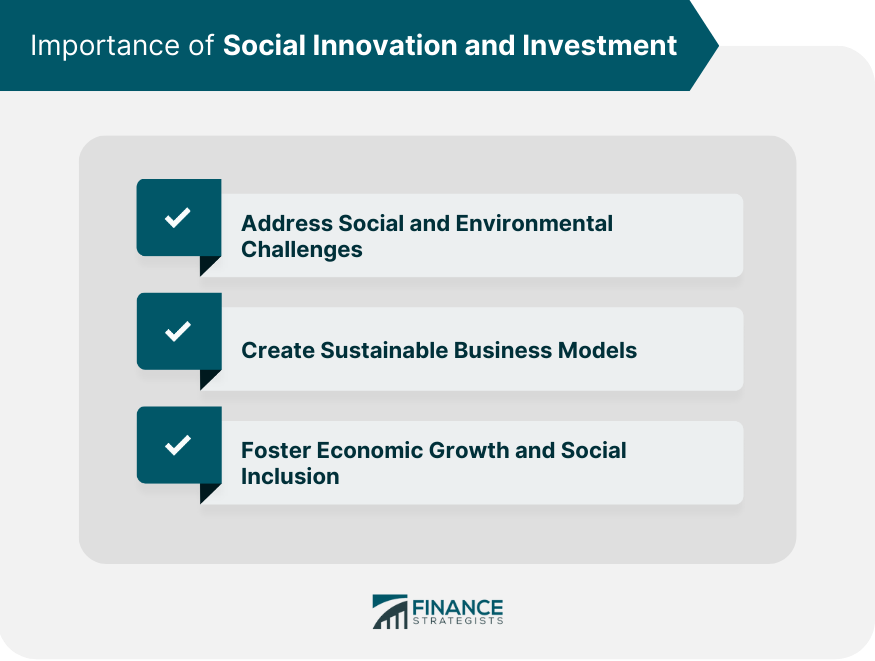
Addressing Social and Environmental Challenges
Creating Sustainable Business Models
Fostering Economic Growth and Social Inclusion
Types of Social Innovation
Product and Service Innovations
Process Innovations
Organizational Innovations
System Innovations
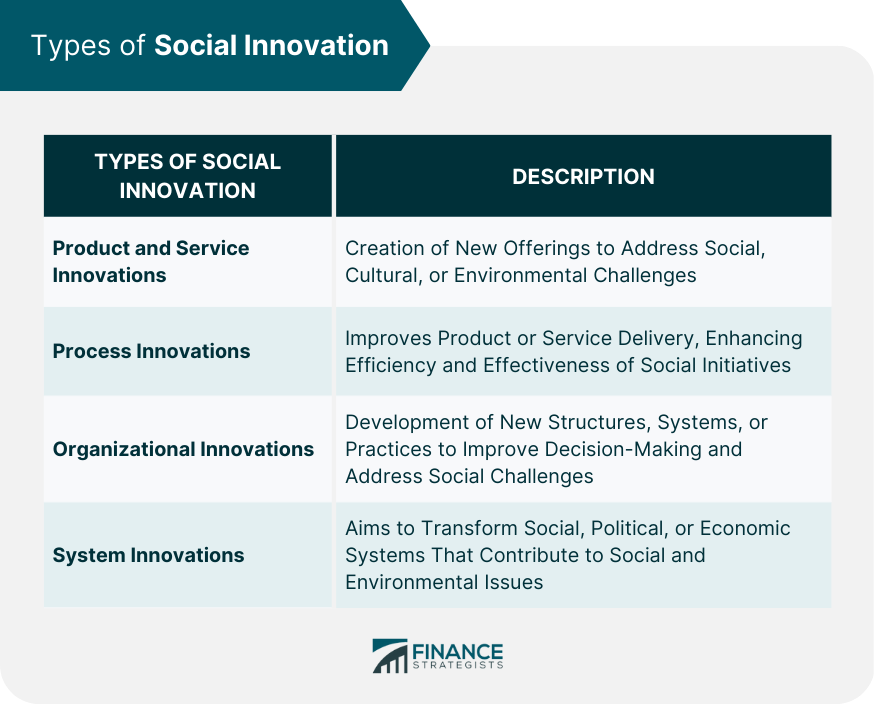
Social Investment Landscape
Impact Investing
Social Impact Bonds
Venture Philanthropy
Corporate Social Responsibility (CSR) Investments
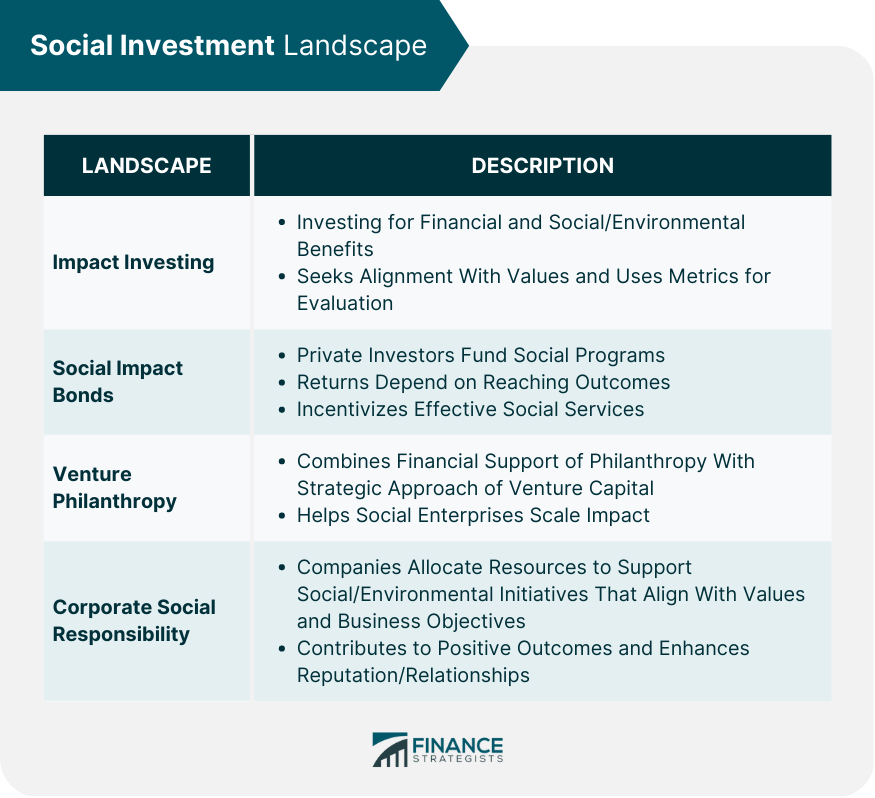
Key Players in Social Innovation and Investment
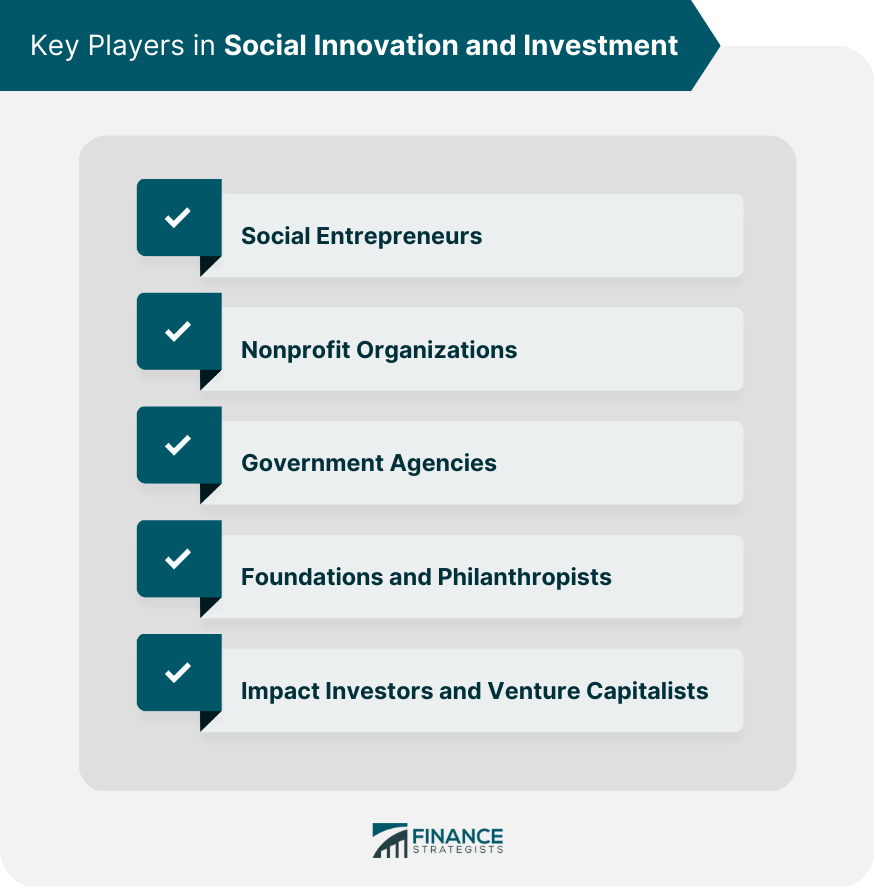
Social Entrepreneurs
Nonprofit Organizations
Government Agencies
Foundations and Philanthropists
Impact Investors and Venture Capitalists
Measuring Social Innovation and Investment Outcomes
Establishing Impact Metrics
Monitoring and Evaluation
Reporting and Communication
Challenges and Opportunities in Social Innovation and Investment
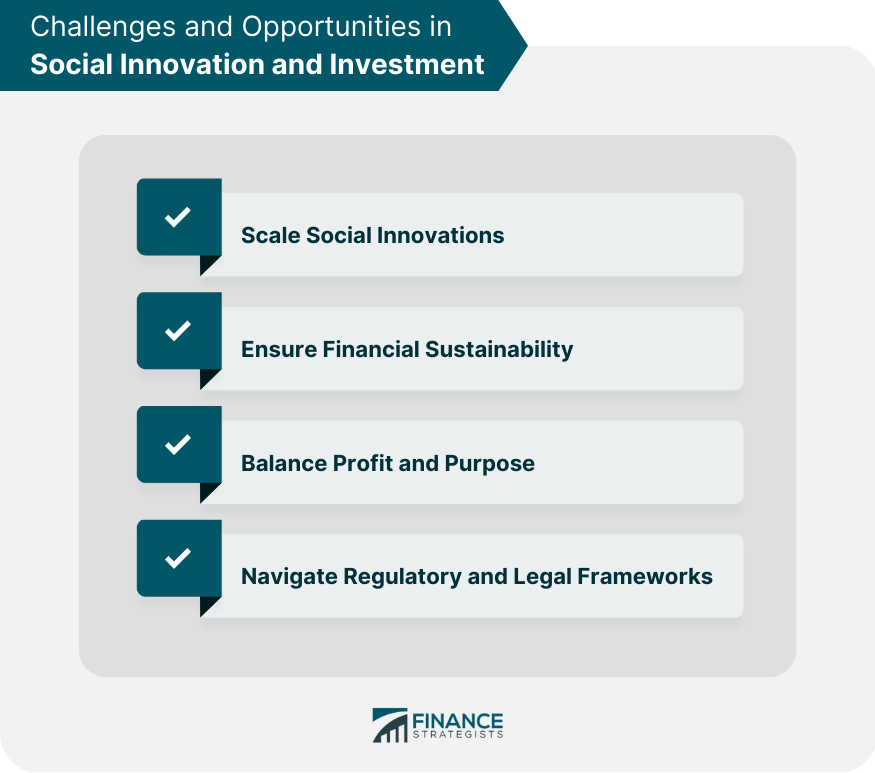
Scaling Social Innovations
Ensuring Financial Sustainability
Balancing Profit and Purpose
Navigating Regulatory and Legal Frameworks
Final Thoughts
Social Innovation and Investment FAQs
Social innovation refers to developing and implementing novel solutions to address social, cultural, or environmental challenges. Social investment is the provision of financial resources to organizations, initiatives, or projects that aim to generate both a financial return and positive social or environmental outcomes.
Social innovation and investment can drive systemic change and promote a more equitable, sustainable future by supporting innovative approaches and directing financial resources towards solutions with the potential for meaningful impact.
The key players in social innovation and investment include social entrepreneurs, nonprofit organizations, government agencies, foundations, and impact investors.
Balancing the need for financial viability with a commitment to social impact can be challenging, requiring innovative business models, strategic partnerships, and ongoing access to resources.
To measure social innovation and investment outcomes, establish clear impact metrics tailored to the project, use monitoring and evaluation processes to collect and analyze data, and ensure effective reporting and communication to maintain transparency and accountability.
True Tamplin is a published author, public speaker, CEO of UpDigital, and founder of Finance Strategists.
True is a Certified Educator in Personal Finance (CEPF®), author of The Handy Financial Ratios Guide, a member of the Society for Advancing Business Editing and Writing, contributes to his financial education site, Finance Strategists, and has spoken to various financial communities such as the CFA Institute, as well as university students like his Alma mater, Biola University, where he received a bachelor of science in business and data analytics.
To learn more about True, visit his personal website or view his author profiles on Amazon, Nasdaq and Forbes.















